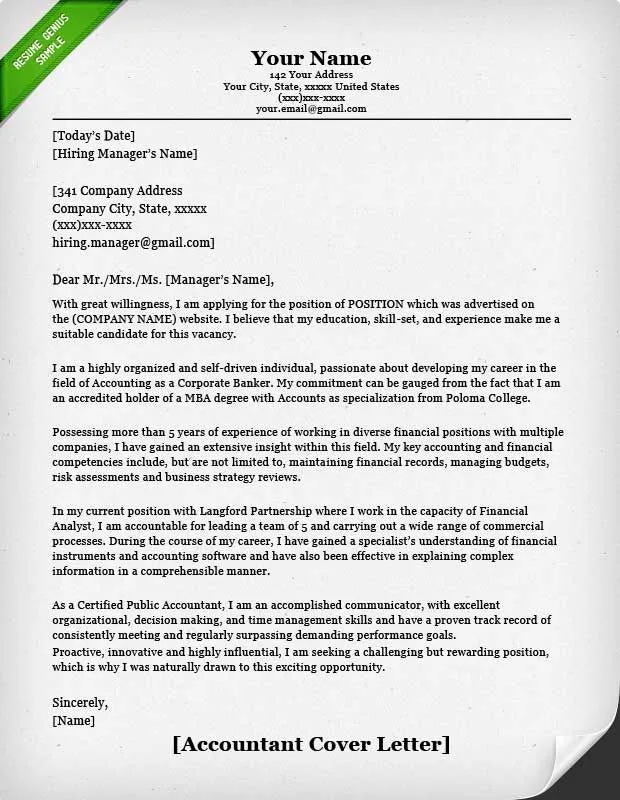Crafting Your Accounting Cover Letter H2
A well-crafted accounting cover letter is your first impression on a potential employer. It’s more than just a formality; it’s a vital tool to showcase your qualifications, demonstrate your enthusiasm, and ultimately, land an interview. The goal is to stand out from the competition and convince the hiring manager that you’re the perfect fit for the role. This guide will walk you through the essential steps to create a compelling cover letter that gets results. It’s important to be professional, informative and concise.
Understanding the Accounting Job Market H3
Before you start writing, understanding the current accounting job market is essential. Researching the industry trends and the specific companies you’re applying to will help you tailor your cover letter to resonate with each employer. This means knowing what skills and experience are currently in demand, and what the company values most. This will also inform how you present your experience and skills. Demonstrate your understanding of the role of an accountant in the current market. Your cover letter should show you are up-to-date.
Researching the Company H4
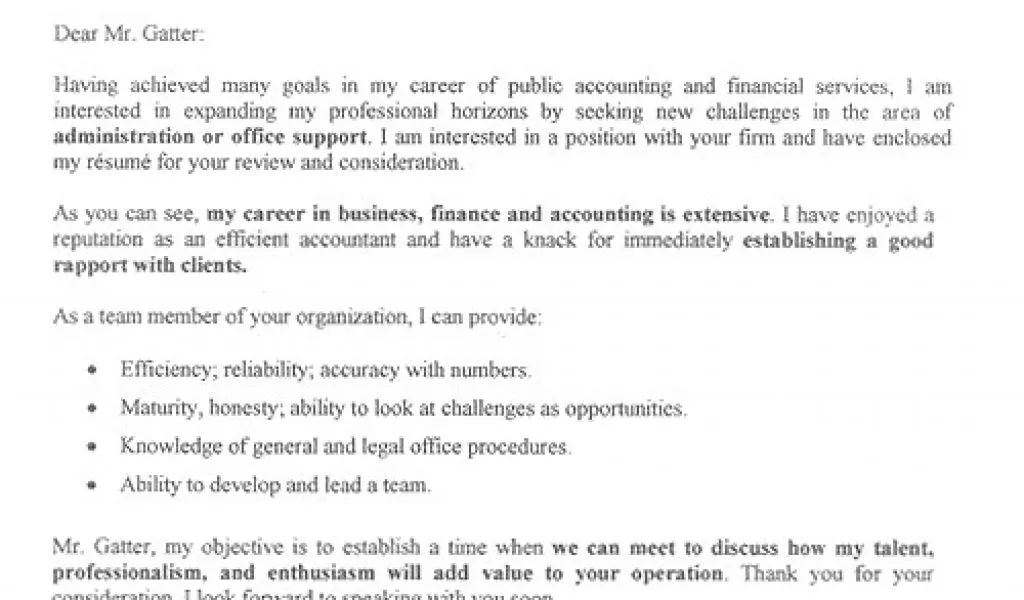
Thoroughly research each company before submitting your cover letter. Visit their website, read their ‘About Us’ section, and check their social media profiles. Understand their mission, values, and recent news. Look for information that can help you align your skills and experiences with their needs. This research will also help you personalize your cover letter, showing that you’re genuinely interested in the company and not just sending a generic application. Demonstrate your interest in their work.
Analyzing the Job Description H4
Carefully analyze the job description, paying attention to the required skills, qualifications, and responsibilities. Identify the key requirements and tailor your cover letter to address each one. Highlight your relevant experiences and skills that match the job requirements. Use keywords from the job description to make your cover letter more likely to pass through applicant tracking systems (ATS). Make sure you are clear on what they are looking for. Then you can highlight these things.
Formatting Your Accounting Cover Letter H2
The format of your cover letter is crucial to making a positive impression. A well-formatted letter is easy to read and professional. A clear and concise format will help the hiring manager quickly grasp your qualifications. Use a standard business letter format, including clear sections for contact information, salutation, body paragraphs, and closing. Proper formatting can significantly increase the readability of your letter. Use a professional font like Times New Roman, Arial, or Calibri, in a readable size (11 or 12 points). Avoid using excessive colors, graphics, or unusual fonts as they can distract from the content.
Contact Information H3
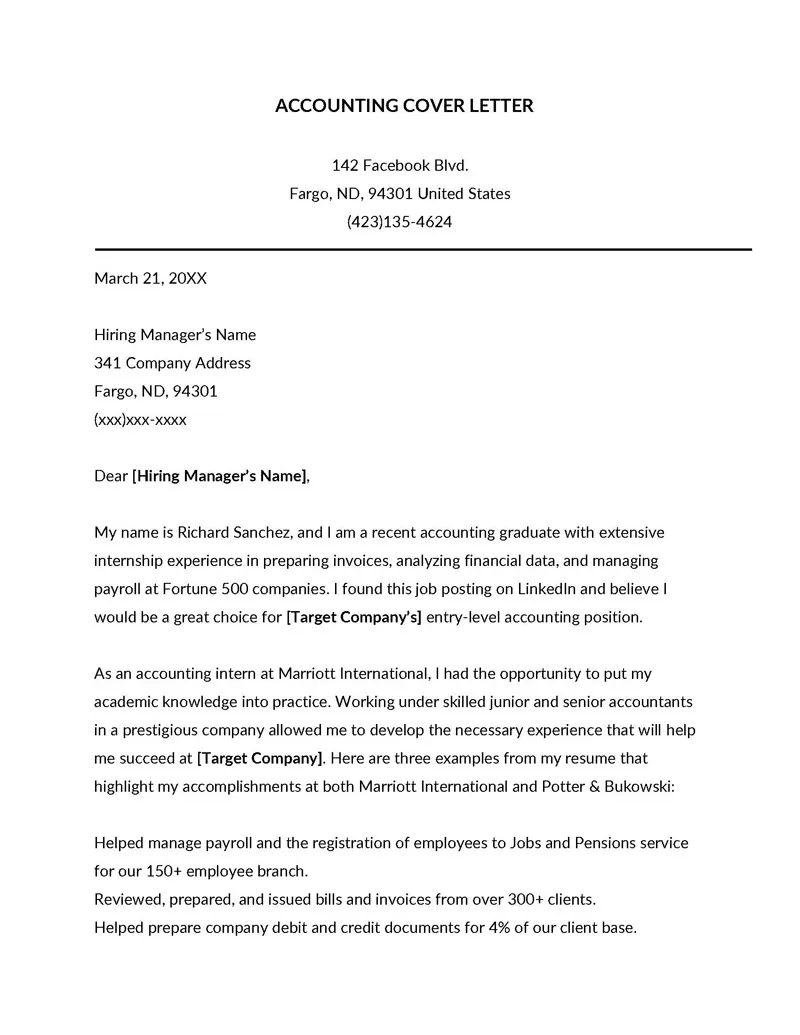
At the top of your cover letter, include your contact information, such as your name, phone number, email address, and LinkedIn profile URL (if applicable). Ensure your email address is professional. This information should be clearly visible and easy to find. This is a fundamental step that ensures the hiring manager can easily reach you if they are interested in scheduling an interview. Ensure all information is correct, including your contact number and email address.
Date and Salutation H3
Include the date below your contact information, followed by the hiring manager’s name and title (if known) and the company’s address. Start your cover letter with a professional salutation, such as “Dear Mr./Ms. [Last Name],” or “Dear Hiring Manager.” If you are unsure of the hiring manager’s name, it’s acceptable to use “Dear Hiring Manager” or “Dear [Company Name] Hiring Team.” Avoid generic greetings such as “To Whom It May Concern” as they are impersonal.
Body Paragraphs H3
The body paragraphs are the heart of your cover letter, where you showcase your qualifications and enthusiasm. Structure your body paragraphs logically and concisely. Use a clear and engaging writing style to capture the reader’s attention. Divide your body into three or four paragraphs, each addressing a specific aspect of your suitability for the role. Each paragraph should serve a specific purpose, such as introducing yourself, highlighting your skills, and expressing your interest in the position.
First Paragraph Grabbing Attention H4
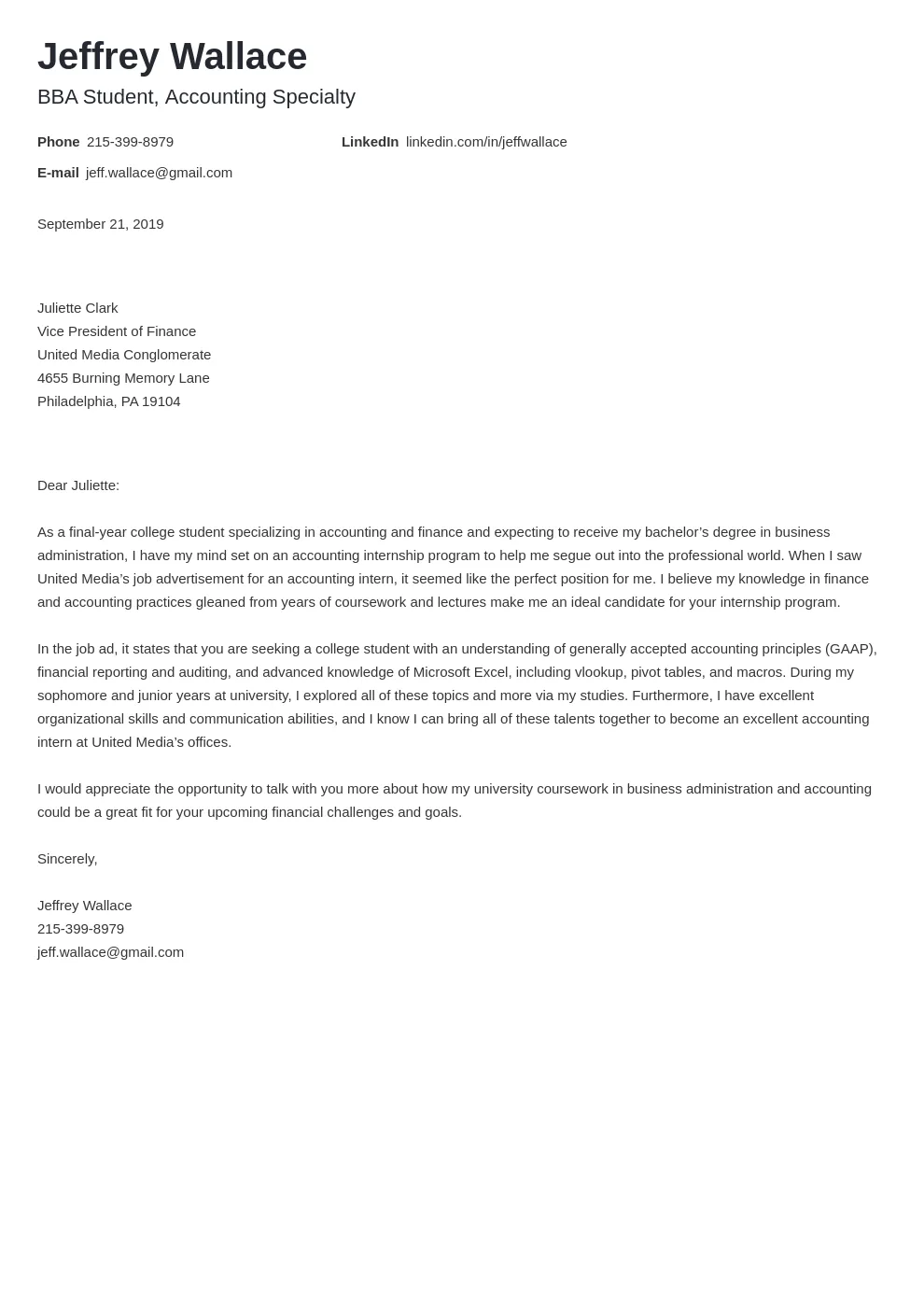
Start your first paragraph with a strong opening statement that captures the reader’s attention. Clearly state the position you are applying for and how you learned about it. Briefly mention your key qualifications and why you’re interested in the company. This paragraph sets the tone for the rest of the letter and encourages the reader to continue. Make your opening statement clear and concise, expressing your enthusiasm for the role and the company. Show you are a perfect fit for the job.
Second Paragraph Highlighting Skills H4
In the second paragraph, provide details about your relevant skills and experience. Focus on the skills and experiences that align with the job requirements. Use specific examples to demonstrate your abilities and achievements. Quantify your accomplishments whenever possible, such as by mentioning the amount of money you saved or the number of projects you successfully completed. This helps you get the job by proving your claims. Using examples will support your claims and helps to give you a better chance.
Third Paragraph Showing Enthusiasm H4
In the third paragraph, express your enthusiasm for the company and the position. Explain why you are interested in working for this specific company and how your values align with their mission. Mention any relevant skills or experiences you have that make you a great fit for the company culture. Show genuine interest and make sure your values match with their mission and goals. This paragraph allows you to connect with the hiring manager and showcase your passion for the role and the company.
Closing Your Cover Letter H3
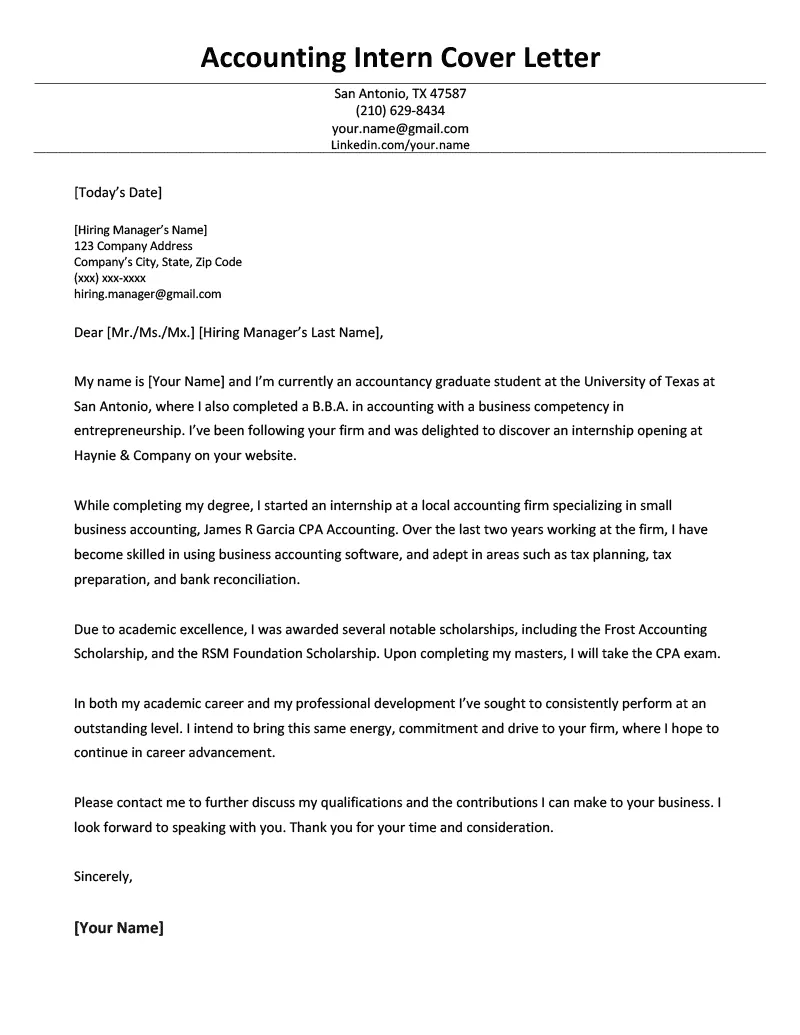
Conclude your cover letter with a strong closing paragraph. Reiterate your interest in the position and thank the hiring manager for their time and consideration. Include a call to action, such as stating your availability for an interview and how you can be reached. End with a professional closing, such as “Sincerely,” or “Best regards,” followed by your typed name. Ensure your closing paragraph leaves a lasting impression and encourages the hiring manager to take the next step.
Proofreading and Editing H3
Before submitting your cover letter, carefully proofread and edit it to eliminate any errors. Check for typos, grammatical errors, and formatting inconsistencies. Have a friend or colleague review your cover letter for a second opinion. A polished and error-free cover letter demonstrates attention to detail and professionalism. A cover letter riddled with errors can reflect negatively on your attention to detail and writing skills. Proofreading is a very critical step, so don’t skip it.
Essential Skills to Showcase H2
Highlighting your relevant skills is essential to getting the job. Tailor your cover letter to the specific requirements outlined in the job description. Emphasize the skills that match the employer’s needs. Include both technical and soft skills to demonstrate your qualifications. Showcase skills using examples. Back up each skill with a project or something you completed.
Technical Skills H3
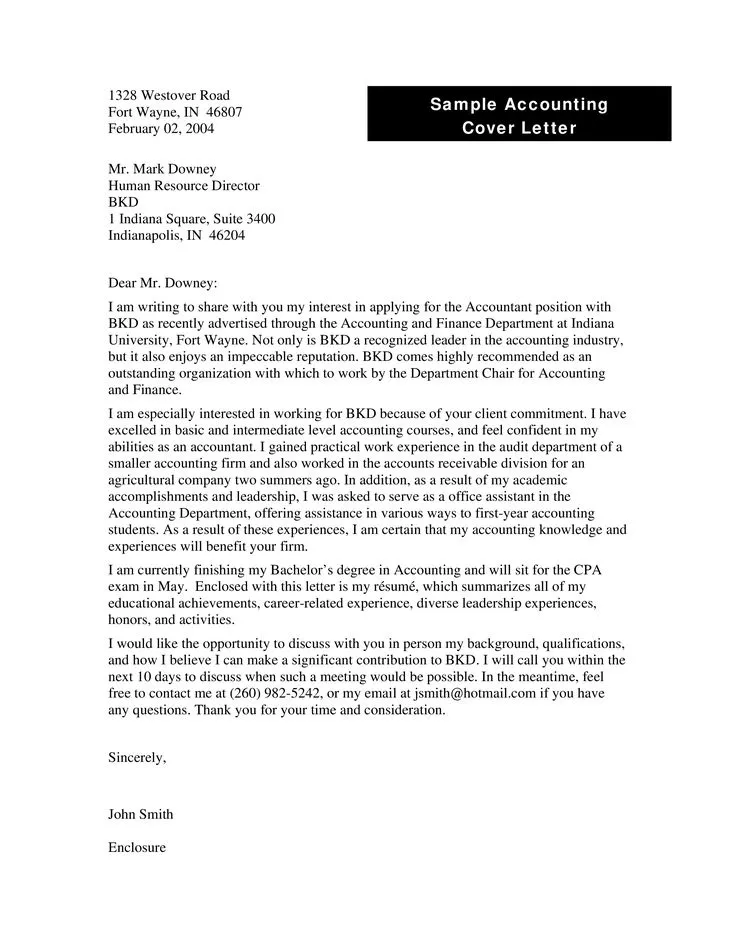
Technical skills are job-specific abilities. These are accounting principles and practices. Include software proficiency, such as experience with QuickBooks, SAP, or Excel, and knowledge of financial reporting, auditing, and tax regulations. Ensure your technical skills align with the job requirements. Show the specific software, accounting principles you are adept with. This will help you increase your chance of getting hired.
Soft Skills H3
Soft skills are essential for succeeding in any workplace environment. Include communication, problem-solving, teamwork, and time management skills. Provide examples of how you’ve demonstrated these skills in past experiences. Strong soft skills can help you become a valued team member and contribute positively to the company. These skills play a role in team building and management. Soft skills are an important part of any candidate. Make sure you show your knowledge and experience.
Tailoring Your Cover Letter H2
Tailoring your cover letter to each job application is a critical step in the job application process. Generic cover letters are often discarded because they lack the specific details and enthusiasm that employers are looking for. Personalizing your cover letter demonstrates that you have taken the time to understand the company and the specific role. This can significantly increase your chances of getting an interview. Make sure you include the details the employer needs.
Keywords Optimization H3
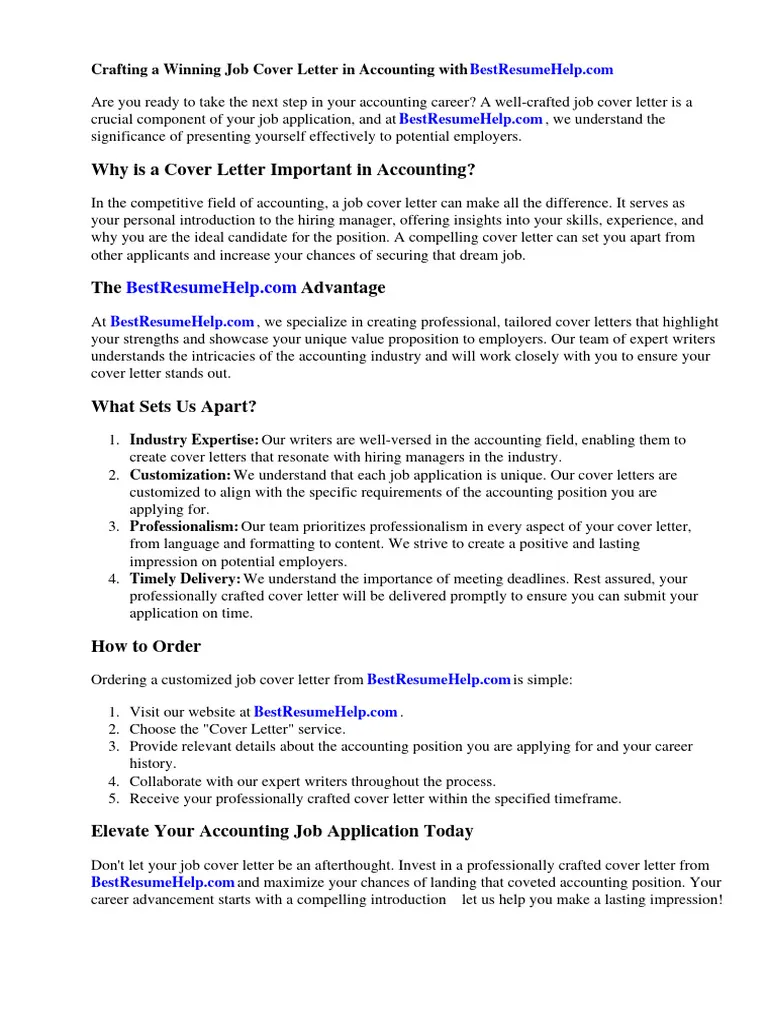
Optimize your cover letter with keywords from the job description. Use these keywords naturally throughout your letter to demonstrate your understanding of the role and make your application more likely to pass through ATS. Strategically incorporate relevant keywords into your cover letter to highlight your skills and experiences. Using keywords will help you highlight your skill set. It will also help you get past the ATS.
Matching Skills to Requirements H3
Carefully match your skills and experience to the requirements listed in the job description. Provide specific examples of how you’ve demonstrated those skills in previous roles. This approach helps you showcase your capabilities effectively. Focus on the most relevant and in-demand skills to make a strong case for your candidacy. Make sure you list out relevant projects and experiences. Your experience will make you more attractive to employers.
Common Mistakes to Avoid H2
Avoiding common mistakes is essential for creating a compelling cover letter. These mistakes can create a negative impression and reduce your chances of getting an interview. By being aware of these pitfalls, you can ensure that your cover letter is professional and effective. Pay attention to details and be clear and concise in your writing. Avoid these common mistakes.
Generic Content H3
Avoid using generic content that could apply to any job. Tailor your cover letter to each specific role, highlighting relevant skills and experiences. Generic cover letters lack the personalized touch that employers look for. Avoid using the same cover letter for multiple jobs. Personalizing your cover letter makes it easier to read. This is also essential to help highlight your experience.
Typos and Grammatical Errors H3
Typos and grammatical errors can create a negative impression and make you appear unprofessional. Carefully proofread your cover letter to ensure it is free of errors. A cover letter with errors can detract from your qualifications. Always proofread your cover letter for errors. Proofreading is an important step in the application process. Typos and grammatical errors are a turnoff for recruiters.
Lack of Enthusiasm H3
Show your enthusiasm for the position and the company in your cover letter. Express your interest in the specific role and how your skills align with the company’s values. Demonstrate your passion for accounting and your desire to contribute to the company’s success. A cover letter that is not enthusiastic can make the applicant seem unmotivated. Express your interest to help you get the job.
The Power of a Strong Closing H2
A strong closing paragraph is crucial for leaving a lasting impression and encouraging the hiring manager to take action. Restate your interest in the position, thank the hiring manager for their time and consideration, and include a call to action. This will increase your chances of getting a response. A clear and confident closing paragraph shows that you are interested in the role. Concluding the cover letter strong will help you get the job. Use this to help get your dream job. This will increase your chances of getting hired.
